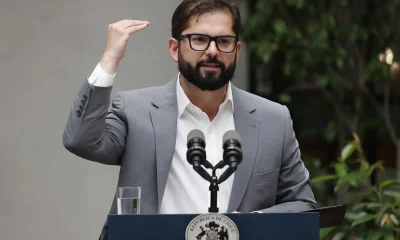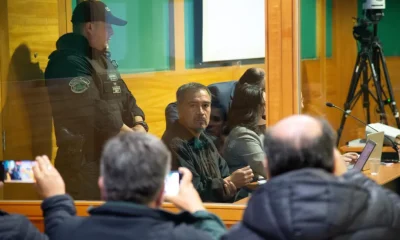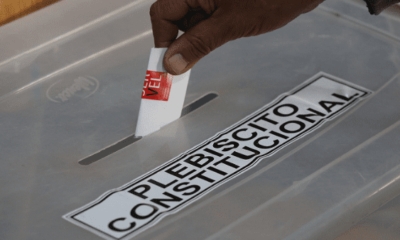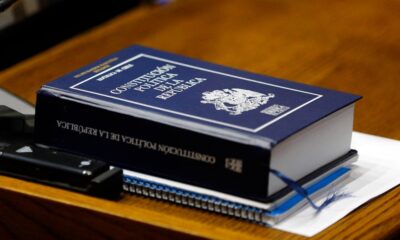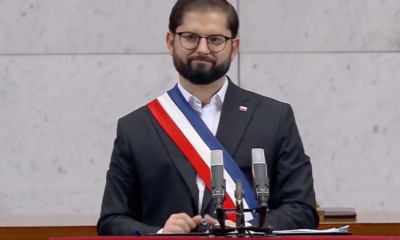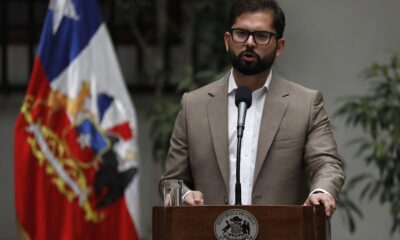International
Chilean President abandons his fiscal reform and presents new proposal
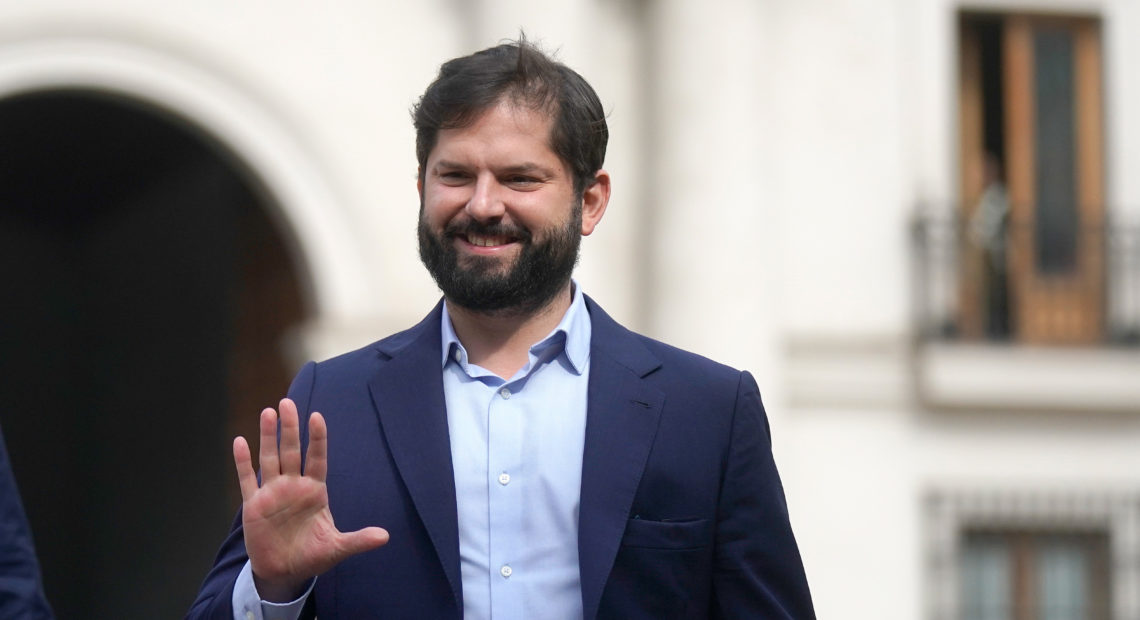
August 2|
Chilean President Gabriel Boric said on Tuesday that his government will not insist on a rejected tax reform bill and will promote new initiatives to raise the necessary funds to address some of its promised social proposals.
In June, the leftist ruler had said that his government would insist at the end of July in the Senate to resume the legislative processing of the tax adjustment.
Through a new Fiscal Pact, Boric said that the spending proposals involve resources for 8,000 million dollars to finance programs such as the Universal Guaranteed Pension to improve the lowest pensions, reduction of waiting lists in health, as well as greater investment in citizen security.
“This proposal considers the contribution made by growth, the reform of the state, the strengthening of tax oversight and taxes paid by the higher income sectors to be able to finance in this way the social expenses that are urgent,” he said in a televised speech.
“We are not going to insist in the Senate with the bill that was previously rejected”, he added.
Boric did not specify deadlines for the delivery and processing of the initiatives, or how much the total collection is expected to be.
The government’s new proposal will be divided into two projects, one to improve tax compliance and the other to adjust income tax focused on those with greater resources.
“This initiative will also include tax incentives for investment, productivity and formalization, as well as benefits for the middle class and a new regime for smaller companies,” he said.
He specified that the tax incentives would be equivalent to 0.5 points of the Gross Domestic Product (GDP).
The first project includes measures that seek to increase tax collection through legal modifications that do not imply a tax increase, which would increase tax collection by 1.5% of the GDP in net terms, according to a government minute.
Meanwhile, the second will be focused on income tax for both companies and individuals and will include incentives for investment, productivity and formalization, as well as benefits for the middle class and the new tax regime for smaller companies, which would have a fiscal cost of 0.5% of GDP.
At the investment level, tax incentives such as semi-instantaneous depreciation and a tax credit fund for investments with a multiplier effect on activity, employment and environmental sustainability are proposed.
It also commits to reduce by 30% the processing time for mining projects, according to the minutes.
Additionally, the plan includes five priority areas of productive diversification that by 2026 foresees three or four new lithium projects, two thirds of the energy matrix with renewable sources, 10-12 projects in the development of green hydrogen and an increase in the digital economy.
The original tax reform bill was rejected in March by the deputies and the government could only insist on its passage through the Senate.
International
Claudia Sheinbaum: Operation Against ‘El Mencho’ Was Based on Pending Arrest Warrants

Mexico’s President Claudia Sheinbaum on Wednesday rejected claims that the military operation that resulted in the death of Nemesio Oseguera Cervantes, known as “El Mencho,” leader of the Jalisco New Generation Cartel (CJNG), was carried out under pressure from the United States government.
Sheinbaum explained that the deployment of federal forces was aimed at executing outstanding arrest warrants against Oseguera Cervantes, who was considered one of the most wanted criminals in both Mexico and the United States.
“That was not the objective (to ease pressure from the United States). It is very important, and I want to repeat it. This individual had an arrest warrant, or several,” Sheinbaum said, referring to the operation conducted on February 22.
According to the president, the initial goal was to capture Oseguera Cervantes, but military forces responded after coming under attack during the intervention.
“The operation was to detain him. The problem is that they were attacked — the Secretariat of National Defense — and they responded at that moment,” she said.
The president insisted that the action was not carried out in response to external demands, although she acknowledged intelligence cooperation with the United States.
“It was not done in any way because of pressure from the United States, not at all. Of course, there was intelligence information from the United States that was used specifically,” she concluded.
International
Spain Denies Any Agreement to Cooperate with U.S. Military in Iran Operations
International
White House Says Spain Agrees to Cooperate with U.S. Military After Trump Threatens Trade Embargo

White House Press Secretary Karoline Leavitt said Wednesday that Spain has agreed “in recent hours” to cooperate with the U.S. military, following President Donald Trump’s threat to impose a trade embargo on Madrid.
Trump had warned of potential commercial measures after Spain reportedly refused to allow the Pentagon to use facilities at Spanish military bases for operations related to Iran.
“With respect to Spain, I think you heard the president’s message yesterday loud and clear, and I understand that in recent hours they have agreed to cooperate with the United States military,” Leavitt said during a press briefing.
She added that the U.S. military is currently coordinating with its counterparts in Spain. However, the president expects broader support.
“The president expects that all of Europe, all of our European allies, of course, will cooperate in this important mission — not only for the United States, but also for Europe,” Leavitt said.
Her remarks came in response to questions about Spain’s position and its role as a U.S. ally amid rising tensions surrounding operations involving Iran.
-

 International4 days ago
International4 days agoIran Reports 201 Dead, 747 Injured After U.S. and Israeli Strikes
-

 International3 days ago
International3 days agoBrazil’s Supreme Court Rejects Bolsonaro’s Bid for House Arrest
-

 International2 days ago
International2 days agoSpain’s Prime Minister to Address Nation Amid Trump’s Trade Threats
-

 International3 days ago
International3 days agoAnti-ICE Billboard Campaign Targets Immigration Spending in 31 U.S. Cities
-

 International4 days ago
International4 days agoPope Leo XIV Urges End to ‘Spiral of Violence’ in Middle East
-

 International1 day ago
International1 day agoWhite House Says Spain Agrees to Cooperate with U.S. Military After Trump Threatens Trade Embargo
-

 International3 days ago
International3 days agoTrump Warns of ‘Major Wave’ of Attacks as Iran Conflict Escalates
-

 International3 days ago
International3 days agoMexico Calls for Immediate Probe After National Dies in ICE Custody
-

 International2 days ago
International2 days agoNew York Announces First 2,000 Seats in Universal 2-K Program
-

 Central America2 days ago
Central America2 days agoGuatemala’s Attorney General Fails in Bid for Top Court Seat Amid Corruption Allegations
-

 International1 day ago
International1 day agoSpain Denies Any Agreement to Cooperate with U.S. Military in Iran Operations
-

 Central America1 day ago
Central America1 day agoNicaragua Held Responsible for Harassment of Opposition Prosecutor and His Family
-

 Central America3 days ago
Central America3 days agoPanama Canal Monitoring Trade as Middle East Conflict Disrupts Shipping
-

 International3 days ago
International3 days agoBolivia Orders Three Investigations Into Deadly Military Plane Crash
-

 International2 days ago
International2 days agoWarner Bros. Developing First ‘Game of Thrones’ Movie With ‘Andor’ Writer
-

 International1 day ago
International1 day agoClaudia Sheinbaum: Operation Against ‘El Mencho’ Was Based on Pending Arrest Warrants

































